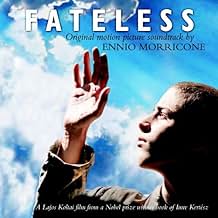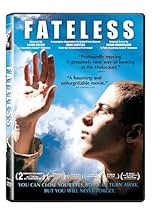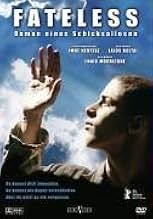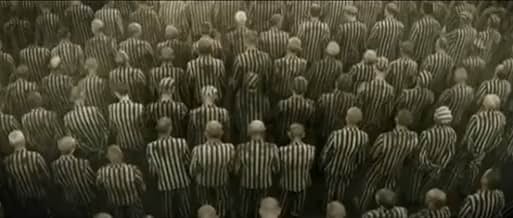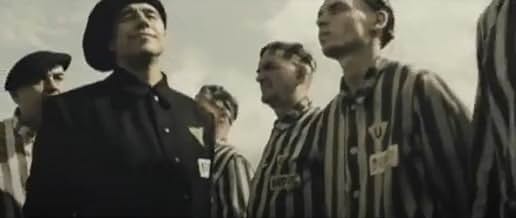Füge eine Handlung in deiner Sprache hinzu14-year-old György's life is torn apart in WWII Hungary, as he is deported first to Auschwitz and then to Buchenwald, where he is forced to become a man in the midst of hatred, and what it r... Alles lesen14-year-old György's life is torn apart in WWII Hungary, as he is deported first to Auschwitz and then to Buchenwald, where he is forced to become a man in the midst of hatred, and what it really means to be Jewish.14-year-old György's life is torn apart in WWII Hungary, as he is deported first to Auschwitz and then to Buchenwald, where he is forced to become a man in the midst of hatred, and what it really means to be Jewish.
- Auszeichnungen
- 6 Gewinne & 7 Nominierungen insgesamt
- Moskovics
- (as Dani Szabó)
Empfohlene Bewertungen
Marcell Nagy is outstanding as Gyuri, the young man who moves from a childlike innocence to world-weariness in the span of one year. With his soulful face and expressive eyes, he is almost a detached observer, quietly pondering his fate. He is, in the Sufi saying, in the world, but not of it and the film unfolds as in a lucid dream that blurs the lines between appearance and reality. Koltai captures this almost matter-of-fact quality as Gyuri says goodbye to his father (Janos Ban) who has been ordered to work in a Nazi labor camp. Because Hungarians did not feel the full brunt of Nazi persecution until the Nazi takeover in 1944, Gyuri thinks his father is just going to have to work hard and that nothing will happen to him. Neighbors and relatives who reassure him that everything will be all right do not further his grasp of reality.
When the boy and his friends are detained on a bus on the way to work, he learns quickly that "his carefree childhood days are now over". Still not comprehending the magnitude of what is taking place, he is annoyed but not frightened and does not seize the opportunity to escape offered by a friendly cop. Even when he arrives at Auschwitz, he sits on the ground shaven and wearing a striped uniform, talking with friends as if he was in a school playground during recess. When Gyuri discovers that "he could be killed at any time, anywhere", he attains a sort of spiritual freedom and his determination to survive is increased. Pretending to be sixteen, Gyuri escapes the gas chamber and is sent to Buchenwald and then to a smaller camp.
The scenes of murder, death, and dying at the camps are thankfully left to the imagination and the film focuses on Gyuri's personal reactions to what he sees around him. Koltai, a cinematographer for twenty-five years, creates a visual cinematic poem in which his color palette is so muted that we experience the mud and the atmosphere of cold and gray almost viscerally. Sadly, we watch Gyuri's transformation from the confident teenager we saw at the beginning to an emaciated number, his leg so swollen and infected that he can barely walk. In voice-over, however, he talks about the hours between work and the evening meal as one of quiet reflection and about the joy in discovering a piece of meat or potato in his soup. He is also sustained by a friend he develops in fellow Hungarian Bandi Citrom (Aron Dimeny) who protects him and tries to teach him the skills of survival. Bandi, ever the optimist, proclaims, "I will walk down Nefelejcs Street again" One of the surprises in the film is the treatment Gyuri receives at what looks like a camp hospital.
He is cleaned, allowed to sleep alone in a bed and taken care of, a set of circumstances not usually associated with extermination camps, yet based on Kertesz' actual experience. The most discussed aspect of the film, however, takes place in Budapest after the liberation. Gyuri feels more alone than he did at Buchenwald and even expresses a sort of homesickness for the camaraderie he felt at the camp. Friends and neighbors who were not in the camps cannot understand what it was truly like and Gyuri cannot explain it. Even if he could, no one really wants to hear anything that rattles their preconceptions.
He rebels at playing the role of the victim and says, "there is nothing too unimaginable to endure". When asked about the atrocities, he talks of his happiness. "The next time I am asked", he says, "I ought to speak about that, the happiness of the concentration camp. If indeed I am asked. And provided I myself don't forget". His "happiness", according to Kertesz, who also wrote the screenplay, is not a form of denial but an act of rebellion against those who do not see him any longer as a human being, only as a victim. It was a way of assuring his responsibility, of defining his own fate rather than having others decide it for him. For me, it also added a portal into the sublime.
If one has read Levi's Survival at Auschwitz, or Elie Wiesel's Night, many of the details of the story are familiar. But the craft is in the telling, and the director has done an excellent job of bringing a memoir of brutality and survival to life.
A brief synopsis, without spoilers, is that this is the story of a teenaged boy in Budapest in 1944 who is swept up in the Nazi roundup of Hungarian Jewry, and his experience in the concentration camps. (Elie Wiesel was interred in the same roundup.) The story of how Eichmann tried to ransom Hungarian Jewry to the West is interesting background, for those who are intellectually curious. (The allies were afraid to provide materiel and resources to the Nazis, fearing prolongation of the war. A very sad tale).
Making a film of the Holocaust is always a challenge. A director must strive to make the scenes powerful, without being melodramatic. There is also the danger of making another movie over again (eg, Schindler's List; The Reawakening; Europa, Europa). The challenge is to remain faithful to truth, while bringing artistry to the telling of it.
One device which is used to great effect is the use of very brief scenes, perhaps less than one minute, which tell a brief vignette of the daily life in the camps. Some have very little dialog, and they seem random and unconnected, yet together they add to a deeply moving experience.
Many films of the Holocaust are shattering; a few are hopeful. This is neither, but it is a telling of the story that is watchable for most audiences, yet retains the power to affect a viewer. 8 out of 10.
Marcel Nagy is spectacular, the director chose an amazing face and voice for the part, the character's attitude towards what's happening is shockingly mature and disaffected. He doesn't break down crying, or screaming , "why?!", he simply accepts that this has happened and tries to deal with it almost entirely inside his head. He is an introvert, speaking softly, and politely to those around him. He doesn't ask too many questions because he already thinks he knows all the answers. And these terrible answers are projected to the audience with the use of his powerful blue eyes, and his vital facial expressions (there are few scenes where the boy looks directly into the camera, and makes eye contact with you, the audience and I almost burst out crying..)
The look of the film was what made the rest so sublime, the grays and blues were so dis-enchantingly beautiful, as horrid in a way it is to call a Holocaust film beautiful, the effect is more of seeing what is inside the mind of an innocent; the dramatization of color desaturating could be considered the gradual removal of that innocence. The best way I could describe this is a 'dreamy nightmare', also so fitting an aesthetic, since a delirium sets in to those suffering, and those watching them suffer - it all becomes so heightened and insane; the men and women here are being stripped of the appreciation of beauty, but kindness among these prisoners remain, and that seems a unique aspect to this story. The fact is that Kertesz's memories include these acts of kindness, and camaraderie, rather than remembering back to it as something so completely horrendous, as as to be denying these victims the right to be human. But they are. In this film, there are no extreme acts of violence or mayhem (some minor, but no guns mowing down innocents like Schindler's List), just a quiet, reflective look at the human condition, and the innocent youth caught in the web of evil's banality.
I think the main problem people had with this film was they were expecting something... a little more dramatic, while this is a very quiet, very slow film that will appeal to those who work on those frequencies.
The film is long but very compelling and speaks loudly about man's inhumanity to his fellow man. The message is even more disturbing when told through the eyes of a young teenager who is caught up in the atrocities of the Nazis and their Hungarian allies.
If this film were in English or directed by Steven Spielberg, it would no doubt win numerous awards. Let us hope that "Fateless" is recognized for it's bravery and excellence.
Wusstest du schon
- WissenswertesThe production unexpectedly ran out of money halfway through and halted for several months in order to find new investors. This ended up working in its favor, since Marcell Nagy was going through puberty, and by the time they restarted, he looked physically more mature, taller, and his voice deeper. By the time his character enters and survives the death camp, he looks several years older than when the film began, adding an element of reality that otherwise would have been created with make-up.
- Zitate
[last lines]
György Köves: [narrating] People only ask about the horrors, whereas I should talk about the happiness of the camps next time, if they ask. If they ask at all. And if I don't forget myself.
- Crazy CreditsFlash v. Schwabenland, Production Dog
- SoundtracksHoldvilágos éjszakán (On a Moonlit Night)
Music by Mihály Eisemann
Lyrics by István Zágon
Sung by the four boys when the group is in transit
Top-Auswahl
- How long is Fateless?Powered by Alexa
Details
- Erscheinungsdatum
- Herkunftsländer
- Offizielle Standorte
- Sprachen
- Auch bekannt als
- Fateless
- Drehorte
- Produktionsfirmen
- Weitere beteiligte Unternehmen bei IMDbPro anzeigen
Box Office
- Budget
- 2.500.000.000 HUF (geschätzt)
- Bruttoertrag in den USA und Kanada
- 196.857 $
- Eröffnungswochenende in den USA und in Kanada
- 12.680 $
- 8. Jan. 2006
- Weltweiter Bruttoertrag
- 2.512.009 $
- Laufzeit
- 2 Std. 20 Min.(140 min)
- Farbe
- Sound-Mix
- Seitenverhältnis
- 2.35 : 1





